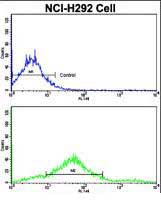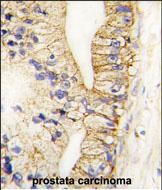


| WB | 咨询技术 | Human,Mouse,Rat |
| IF | 咨询技术 | Human,Mouse,Rat |
| IHC | 1/100-1/500 | Human,Mouse,Rat |
| ICC | 技术咨询 | Human,Mouse,Rat |
| FCM | 1/10-1/50 | Human,Mouse,Rat |
| Elisa | 咨询技术 | Human,Mouse,Rat |
| Aliases | Cadherin-7, CDH7, CDH7L1 |
| Entrez GeneID | 1005 |
| WB Predicted band size | 87.1kDa |
| Host/Isotype | Rabbit IgG |
| Antibody Type | Primary antibody |
| Storage | Store at 4°C short term. Aliquot and store at -20°C long term. Avoid freeze/thaw cycles. |
| Species Reactivity | Human |
| Immunogen | This CDH7 antibody is generated from rabbits immunized with a KLH conjugated synthetic peptide between 56-84 amino acids from the N-terminal region of human CDH7. |
| Formulation | Purified antibody in PBS with 0.05% sodium azide. |
+ +
以下是关于CDH7 (N-term)抗体的3篇参考文献(基于公开信息整理,部分内容可能需要通过原文进一步验证):
---
1. **文献名称**:*CDH7 regulates neuronal migration and differentiation through Rho GTPase signaling*
**作者**:Suzuki, S. et al.
**摘要**:该研究使用CDH7 (N-term)特异性抗体,通过免疫组织化学和Western blot分析,揭示了CDH7在小鼠大脑皮层神经元迁移和突触形成中的作用。研究发现CDH7通过调控RhoA信号通路影响神经元极性,抗体验证了其在神经发育中的表达模式。
---
2. **文献名称**:*Cadherin-7 mediates cancer cell invasion via EMT in colorectal carcinoma*
**作者**:Wang, Y. et al.
**摘要**:此研究利用CDH7 (N-term)抗体在结直肠癌组织样本中检测CDH7蛋白表达,发现其高表达与上皮-间质转化(EMT)和转移相关。抗体特异性通过siRNA敲低实验验证,证实CDH7可作为癌症预后的潜在标志物。
---
3. **文献名称**:*Characterization of CDH7 expression in the developing mouse inner ear*
**作者**:Boutros, P. J. & Fritzsch, B.
**摘要**:研究通过CDH7 (N-term)抗体的免疫荧光染色,系统分析了CDH7在小鼠内耳发育中的时空表达。结果显示CDH7在耳蜗毛细胞和支持细胞中动态表达,提示其参与听觉系统的细胞粘附和形态发生。
---
**备注**:若需具体文献来源,建议通过PubMed或Google Scholar以“CDH7 antibody N-terminal”为关键词检索,并筛选涉及该抗体应用的实验研究。部分抗体公司(如Abcam、Sigma)的产品说明书也可能提供相关引用文献。
CDH7 (N-term) antibody is a specific immunological tool designed to target the N-terminal region of cadherin-7 (CDH7), a member of the cadherin superfamily. Cadherins are calcium-dependent transmembrane glycoproteins critical for cell-cell adhesion, tissue morphogenesis, and cellular signaling. CDH7. encoded by the *CDH7* gene on human chromosome 16q24.2. is classified as a type II classical cadherin. It features an extracellular domain with cadherin repeats, a transmembrane domain, and a cytoplasmic domain that interacts with catenins to link the cytoskeleton.
The N-terminal region of CDH7 plays a pivotal role in mediating homophilic and heterophilic interactions, essential for cellular recognition and adhesion processes. CDH7 is predominantly expressed in the nervous system, including specific brain regions (e.g., thalamus, cerebellum) and sensory organs, suggesting involvement in neural circuit formation, synaptic plasticity, or sensory processing. Aberrant CDH7 expression has been implicated in neurodevelopmental disorders and cancers, though its precise mechanisms remain under investigation.
The CDH7 (N-term) antibody is widely used in research applications such as Western blotting, immunohistochemistry, and immunofluorescence to detect endogenous CDH7 expression, assess localization, or study its functional roles. Validation typically includes reactivity confirmation in knockout controls or recombinant protein systems. Its specificity for the N-terminal domain makes it valuable for distinguishing CDH7 from other cadherins and probing extracellular interactions. Researchers utilize this tool to explore CDH7's contributions to tissue organization, neural development, and disease pathways.
×